Fiction Catch-up
(FYI/Elsewhere: here’s a recent poem of mine up at Leveler [the editors of which, I think awesomely, write criticism-like things to go along with the poems they feature], and here’s my review of one of the year’s best books, Leslie Jamison’s THE EMPATHY EXAMS [seriously, the book's dazzling--here's DGarner's take if you need more/better encouragement, and, for real, the thing's destined to feature on a good bulk of the top ten lists at year's end])
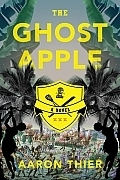 The Ghost Apple by Aaron Thier
The Ghost Apple by Aaron Thier
Good god, if for no other reason, get this book+begin it for the fun of it: it’s as pomo as one’s likely to find (seriously, too: what’s the last real actual postmodern book you’ve read? I ask that in earnest: it’s easy to call certain ticks or shimmies pomo, but I mean actual stuff that’s moving beyond what feel like [to me anyway] sort of tired tricks [self-awareness, the inbent recursiveness of the young, etc.]?) at present: using a mixture of forms, Thier’s awesomely satirizing the classic campus novel. Everything’s in his purview: business practices (agriculture, pharmacology), gender stuff, power stuff, race stuff. It’s massive, what he’s going for here. I don’t know how to sell this simplest: it’s a weird book, bouncing around from form to form to form (the first ‘chapter’ (or whatever: fictional unit) starts with a letter dated 1788; the next thing’s a college recruitment letter. There’s a 70 year old dean going undercover as an underclassman. Look, there’s plenty: read this thing. Their’s written a sharply, sharply funny and insightful novel, and, dig it: it’s his first one. Meaning: this is a fine way to start.
On Earth as It Is in Heaven by Davide Enia
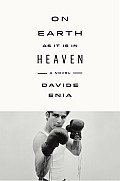
Most propulsive read in a long, long while, this thing set in 1980′s Palermo, Sicily’s a big glorious athletic-paced gangbustery trap set for all wandering attentions. It happens to be most about boxing, but, through boxing, is even more about being a man. That doesn’t sell it anywhere near enough, but the truth is nothing’ll sell this as well as its first pages (which, fortunately for you, you can read through the dark lordship of Amazon [but buy the thing at Powells at least]).
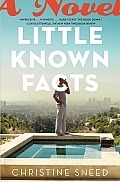 Little Known Facts by Christine Sneed
Little Known Facts by Christine Sneed
Reason #whatever to read Sneed: her first collection of stories was titled Portraits of a Few of the People I’ve Made Cry, which I’ve meant to get but haven’t. Among the reasons I’ll be making much more of a push to get that book: the fantastic ease of the writing here in Little Known Facts. The novel’s this panoramic portrait of a middle-aged Hollywood actor (all the press materials kept saying Harrison Ford, so I guess yr supposed to think: Harrison Ford [I guess it's fine, but I'd argue the book's good enough not to need some Actual Actor to make the reader begin with/from to hang the story on: the book's hook enough]), Renn Ivins, and the story’s told through 11 chapters with various points-of-view: there’s his jackass of a son, his ex-wife, his son’s girlfriend, etc. This trick should not sound annoying or cloying: it works tremendously well, and offers a shifting, stutter-stepped glimpse of this guy. I don’t know quite how to say this: what I mean is that the novel has what feels like a trick set-up, and, even knowing from the start that the chapters will switch POV and voice, you’re still sort of mesmerized and taken-in—even knowing how the trick’s working, it still works, I’m trying to say. All of which doesn’t as much matter, anyway: it’s a compellingly great+quick read.
Once You Break a Knuckle by D. W. Wilson
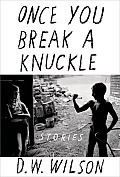
The less from me on this one the better—not because it’s bad, in fact, but the opposite. Wilson’s stories are freakishly compelling things in their wild ways: they read, almost to a one, with incredibly hard surfaces. Any softness within the stories—the emotional core of things—is largely hinted at. This is, yes, a certain (and certainly popular) type of fiction, at present and as ever, yet Wilson’s stuff doesn’t have that flat-as-west-Texas prose so many dudes go for with all the Bible-throated McCarthyisms built in: Wilson writes gorgeous, willowy sentences that feel, to me, deeply like thin branches from a very strong tree (or like the arms of a character, Mitch, in “Don’t Touch the Ground,” arms Wilson writes as follows: “His arms dangled low and scrawny looking until you grappled them. He liked running, climbing, and building things; by the time he turned nine he had scaled every tree in the neighborhood except one—a giant pine with no low branches and a trunk so wide even my old man couldn’t reach halfway around. Mitch called it the Chevy. I don’t know why.” Wilson’s sentences have something of those arms to them: it’s not that they appear scrawny looking, but you can’t guess the full gutting strength of them till you’re in the story.). It’s a fantastic, brutally beautiful book.
It’s been too long since I’ve read a built-for-pleasure-and-speed mystery, and Pavone’s The Accident has been hailed and anticipated for a bit, mostly on the strength of his debut, The Expats, which was a massive hit. The Accident is set in Manhattan (with jaunts to Europe and LA), and, specifically, is set in the book world: the story centers around Isabel Reed, an agent who gets a mysterious, anonymous manuscript titled The Accident. The MS is gripping and amazing and is, in fact, a bio of a media mogul figure featuring revelations that’d take the guy down (not to mention the CIA), and then everyone who comes into contact with the ms begins dying. These books are always silliest when their plots are sketched: what you really want to know about The Accident is 1) are there enough twists to keep you surprised through the end and 2) is the writing mostly good enough to ease you over the almost necessarily hackneyed elements of Big Market mysteries. The answer to both is a big yes: the twists taper off at the very end, as they almost naturally must, but there are still enough to offer a late-paged gasp, and the writing’s way better than it needs to be given the propulsive plot. Are you looking for some serious shit with navels gazed at? Head elsewhere. You want something you’re gonna damn near accidentally set on fire with the friction you create as you grasp for the next page to turn? The Accident, friend: that one’s for you (check Stephen King’s tweet below if you don’t believe:



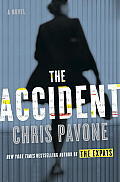 The Accident by Chris Pavone
The Accident by Chris Pavone


